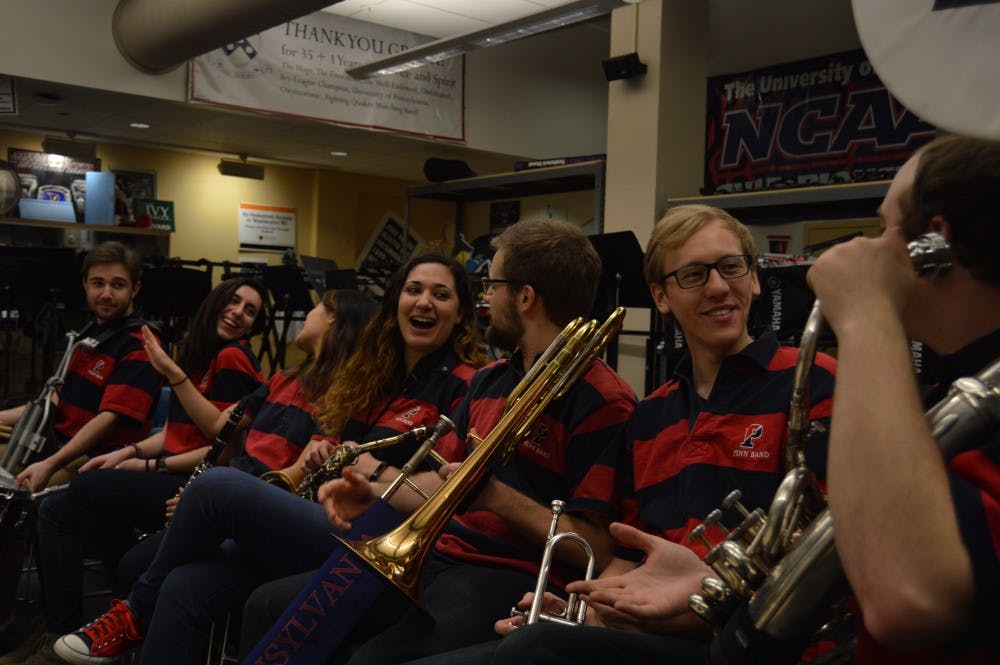They’re the students on campus in the red and blue rugbies. The ones who scream out “RIGHT…LEFT…. RIGHT…SIT DOWN!” when a Princeton player fouls out. The ones playing “The Red and the Blue” at Penn football games.
They’re the Penn Band, or as they refer to themselves, the “bandos.” Made up of about 100 undergrad musicians of all skill levels, it’s one of the oldest organizations at Penn. Between the large number of members and the rich tradition of the group, it’s almost common knowledge on campus that the Penn Band is a pretty close–knit bunch.
When I meet Emily Elenio (C ’19), the current president of Penn Band, she invites me to Platt Student Performing Arts House for a behind–the–scenes look at the life of a “bando” and leads me to the band room. Behind the main rehearsal room is a common area where some of the members are hanging out in between classes. I invite them all to join, and when one member says that she has to study, Emily brings her some of the communal snacks from a table while the rest wish her luck. If it wasn’t already clear just how close the group is, it was now.
And this closeness probably boils down to one reason. When I ask why they decided to join Penn Band in the first place, nearly everyone cited the welcoming environment. For Rendy Fernandez (C ’19), the treasurer of the Band, he officially joined the band after informally hanging out with them throughout the previous semester. As he describes it, “everyone sort of has a fear, when they go into joining a group, of not feeling like they necessarily fit in. That kind of all disappears in the Penn Band.” The band takes musicians of all different skill levels; there’s no auditions for it, which many members say only adds to the strong community of the group.
Of course, the strong community comes at the cost of a demanding practice and performance schedule (though the word “cost” bears little of its typical negative connotation for the members). Not only do members have to practice the music in multiple rehearsals each week, but they also travel with the football and basketball teams on some weekend away games.
Still, the value of the Band that comes with the time is worth it. “It’s all about balancing your priorities. Penn Band is an experience that you’re not going to forget,” Rendy says. In fact, most are actually fans of the frequent rehearsals and road trips for the band. For Jackson Betz (C ’19), a road trip to Dartmouth has allowed him to tick off Vermont and New Hampshire to his list of states he’s visited. The trips also often lead to lasting memories. “When we went to Columbia last year, we all went rowing on the lake in Central Park, and combined our boats into one big super boat. It’s never boring with the Penn Band,” he says.
As essentially another family on campus, everything is done from genuine passion and love—never purely obligation. Perfect attendance, just like initial musical experience, is by no means mandatory for all members. “If you can’t travel for one weekend, there’s usually a home game you could play instead,” says student conductor, Kyle McKee (C ’18). Even Emily encourages that members can “come to what they want; there’s no minimum attendance requirement.” Despite this flexibility, however, Penn Band maintains its presence through the sheer commitment of its members. “Nobody’s required to do any of it, but usually about half the band is coming to 75% of these events,” says John San Soucie (C ’18).
Between practicing, performing, and travelling, there’s no doubt members of the Band spend a significant amount of time together. The community, however, doesn’t stop at the boundaries of the club. To help with the balance of life, Emily helped coordinate what she calls “Band Study,” where members book huge chunks of time in GSR’s to study together. “You can just go to this room, and everyone creates kind of a comforting space, whereas the rest of VP is a big ball of stress,” says Rendy. And as for study breaks during these sessions? Jackson Betz (C ’19), a drumline section leader, told stories of “coffee boat races.”
Throughout the group interview, I consistently got a first–hand exposure to their welcoming nature. After mentioning that I used to play the saxophone, every one of them encouraged me to join the band myself. To me, nothing more thoroughly expresses the sense of camaraderie and friendship I got from them than that.
Whether it was Emily telling me how much she loves playing “Stacy’s Mom,” Rendy describing the friendships he’s formed, or Jackson talking about movie nights and Super Bowl parties with the band, it quickly became obvious that the community of the Penn Band is something special. At a school where tensions and stress levels are always high, it’s comforting to know that supportive groups like the Penn Band are options for us.

